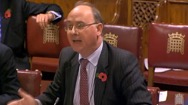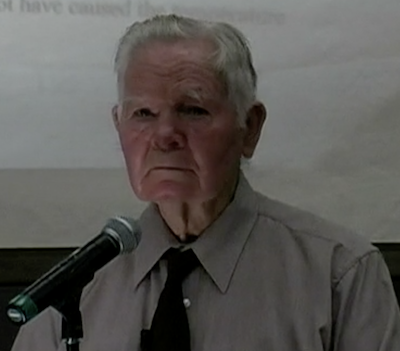The Energy Intensive Users Group (EIUG)
Background
The Energy Intensive Users Group (EIUG) is a lobby organisation that “campaigns for secure industrial energy supplies at internationally competitive prices”, according to its website. Its members are trade associations representing the UK’s most energy intensive and polluting industries.
The EIUG argues that climate policies harm the economic competitiveness of the UK’s most polluting industries. It lists “lobbying for discounts under the Climate Change Levy for energy-intensive sectors which undertake to improve energy efficiency” as an area in which it has had a “key role”.
Its director is Jeremy Nicholson, who can often be spotted at events organised by climate disinformation campaign group, the Global Warming Policy Foundation.
The group shares an office with the EEF, the UK’s largest manufacturing organisation (formerly the Engineering Employers’ Federation), and Nicholson has an EEF email address.
Responding to the government’s announcement of the much-delayed Clean Growth strategy in October 2017, the EEF said: “It is disappointing to see limited mention of the impact climate policy has had on electricity prices in the strategy, specifically the Roadmap to lowering business energy costs promised in the Industrial Strategy green paper.”
Stance on Climate Change
In written evidence to the House of Commons’ Environmental Audit committee in November 2012, the EIUG wrote that it:
“… supports the long term goal of shifting to low carbon energy supplies, although our members have become increasingly concerned about the mounting cost of the UK’s unilateral climate change commitments, their cumulative impact when considered in addition to UK and EU taxes on direct emissions on trade-exposed energy intensive industries, and the consequent risk of carbon leakage.”
Key Deeds
September, 2016
In evidence submitted to the House of Lords’ Economic Affairs Committee, the EIUG claimed:
“The impact of climate policies, and the extent to which their costs affect industrial supplies, is the single biggest reason for the disparity in EU electricity prices.”
December, 2012
EIUG director Jeremy Nicholson told the House of Commons’ Environmental Audit Committee that the EU emissions trading scheme and the UK’s carbon price floor add about £8 per megawatt hour to the cost of electricity for its members. Industry groups, including EIUG’s parent organisation the EEF, have regularly inflated figures on the impact of the carbon price floor on household energy bills.
October, 2012
In evidence submitted to the House of Commons’ Energy and Climate Change committee, the EIUG called for the government to support fracking in the UK. It said:
“UK shale reserves therefore have the potential to provide UK consumers with a secure, indigenous source of energy and hydrocarbon feedstocks, partly replacing the declining output from conventional offshore reserves.”
July, 2010
A report co-commissioned by the EIUG in 2010 suggested the UK’s climate policies could see energy bills increase by as much as 141 percent by 2020.
Photo: screengrab via Parliament TV






